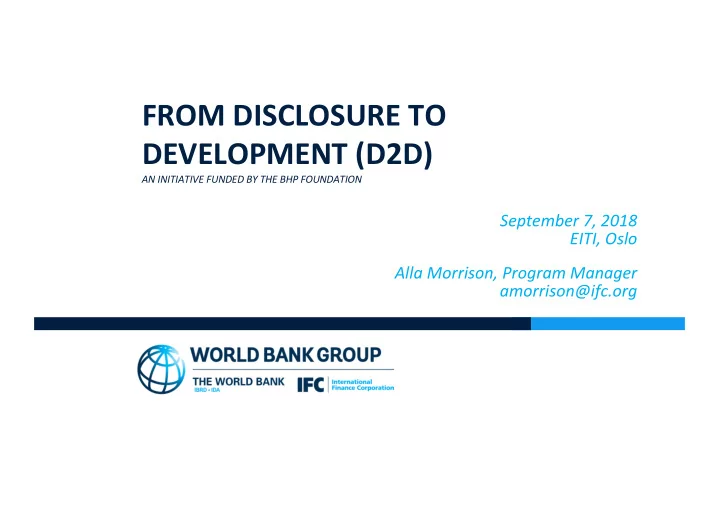

FROM DISCLOSURE TO DEVELOPMENT (D2D) AN INITIATIVE FUNDED BY THE BHP FOUNDATION September 7, 2018 EITI, Oslo Alla Morrison, Program Manager amorrison@ifc.org
D2D: PROGRAM OBJECTIVES Program objectives : to improve utility of natural resource industry data for development impact Structure : joint WB/IFC program led by IFC Funding : $2.5 million over 2 years What do we hope to achieve? Move the needle to enable the various stakeholders to effectively re-use NR data for purposes that are relevant to them 2
D2D: WHAT STAKEHOLDERS ARE TELLING US WHAT WE HEARD CHALLENGE WHAT IT MEANS FOR D2D “It’s not about identifying a universal problem but in Focus on users and their information needs from the • helping define specific problems to solve for specific outset users .” FOCUSING ON Crowd in infomediaries, subject matter experts, the • USERS private sector, civil society, media. “Are we even measuring things the community cares Include local CSOs in advisory committee • about (e.g., wells vs. cows)?” “Nurturing a data culture at the local level needs more Drill down to the “critical” tiers of suppliers and users – • attention.” IDENTIFYING those who are essential for addressing mismatches in data supply and demand TARGET GROUPS “We need to go beyond the “usual suspects” to uncover Sharpen country focus and target communities • currently underserved groups .” “We should focus on getting actionable information out ACCOMMODATING • Understand what exists and where the gaps are that is helpful to all stakeholders , including local citizens, DIFFERENT USER • Explore methodologies, such as guiding principles, to government and private sector.” NEEDS help drive meaningful and actionable data disclosure “ Information alone won’t lead to change .” • Make the process inclusive and emphasize participation. “We must disclose in a way that is accessible and BUILDING TRUST Consider using the WBG to establish common priorities. understandable for the particular stakeholder and context. • Commit to ongoing sharing of results. Without trust, it is meaningless .” “The civil society space is closing, and there’s a lack of civic • Select pilot countries/communities with existing and ADAPTING TO space to use data for accountability.” active civil society NEW CIVIC ROLES • Engage proactively with civic actors, and support their “It’s a difficult political climate in which to engage.” broader development. • Leverage various initiatives such as EITI, OGP, and others “The political will to make data available and to develop ADDRESSING and seek out new partnerships to help deliver D2D. sound policies is not always there .” POLITICAL WILL • Build the business case for government 4
D2D: THEORY OF CHANGE 2
D2D: PROGRAM ACTIVITIES Research : • Evidence base of effective NR data re-use • Assessment of national NR data ecosystems (4 pilot countries) • Effective infomediaries • Barriers to data re-use by communities and civil society • IFC clients experience Convening & knowledge sharing: • National working groups on NR data for development impact • Knowledge products and exchange among countries • Global dialog on NR data disclosure and re-use challenges Innovation: • Test innovative approaches in the pilot countries: Ghana, Mongolia, Peru (public/private sector interventions) 2
D2D: CROSS-REGION APPLICATIONS & LESSONS COUNTRY Ghana: Local Economic Development Mongolia: Water Stewardship Peru/Colombia: Revenue Management Enhance economic development by: • Establish industry-led voluntary code of Provide technical assistance to: • increasing access to information and practice on responsible water • municipalities to improve investment local participation in supply chain, management, including: process and become transparent, INTERVENTION especially women; • disclosure of water risks, water use effective, accountable, responsive to • improving capacity of formal and and water recycling data citizens EXISTING informal entrepreneurs; • universal portal for raw data access • local leaders to enhance capacity to • convening regional development • accessible annual reports for engage in municipal planning decisions partners and create opportunities for communities to monitor and demand accountability communities to participate in decisions • Trained communities, local government, and companies on water data collection CONDUCT NR DATA ECOSYSTEM ASSESSMENTS à TEST TARGETED INTERVENTIONS • Convene a national multi-stakeholder • Partner with local NGOs and media to • Capture lessons from government ENGAGEMENT working group disclose water monitoring info in an POTENTIAL transparency websites and IFC’s • Support open data implementation accessible format for communities experience in the field • Support collaborative design -- sub- • Convene a national multi-stakeholder • Link to open data opportunities national revenue distribution application working group • Track local CSO action based on new • Support open data implementation access to information • Procurement data re-use 6
Recommend
More recommend